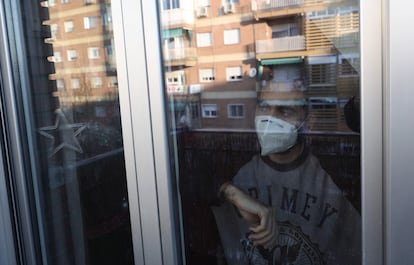Why haven’t I caught Covid despite living with someone who tested positive?
Vaccination status, the immune system and genetics could all influence infection and the development of symptoms

“My partner had Covid and, even though we slept together, I didn’t catch it,” says Ana, 37. It is a common occurrence. There are children who do not infect their parents, grandparents who don’t infect their grandchildren and close contacts with no apparent capacity for transmission. Despite being a highly infectious pathogen, SARS-CoV-2 is not infallible. There are many reasons why it is not unusual for people in the same household to not catch Covid-19 from each other.
Right from the start of the pandemic, it was found that some people were much more likely to catch Covid than others, and some were naturally immune. Each person’s immune system works in a different way and, after several waves of the virus and millions of administered vaccines, each person’s immune system may react to the virus differently.
It is not uncommon for the immune system to reject the pathogen when it enters the body, thereby refusing it time to accumulate a sufficient load to test positive in an antigen test.
Enrique, 76, lives with his wife Clara. Both have had four doses of the vaccine and been recently vaccinated. He has had cold symptoms for several days. After a few nights coughing, he tests positive. Clara does not develop any symptoms at all. But she may have actually been the one to pass the virus on to Enrique. Or she may never have had it at all.
“When the vaccine is very recent, it is possible that the specific neutralizing antibodies are able to prevent the viral load from increasing,” explains Marcos López Hoyos, president of the Spanish Society of Immunology.
Vaccines do not prevent infection, but they do reduce the chances of catching Covid, especially in the weeks and months following infection. Statistically, it is not uncommon to find that despite having the same level of vaccination and exposure, some people become infected, with or without symptoms, and others do not. This is not only due to vaccination, but also to the natural immune response, which is more effective after catching the virus, particularly if the infection has been recent.
Transmission is a probabilistic event and, until proven otherwise, the uninfected individual should avoid increasing the risks of exposure furtherJuan Carlos Galán, Head of Virology at Ramón y Cajal Hospital, Madrid
José Antonio López Guerrero, professor of microbiology at Madrid’s Autonomous University, explains that there are many factors involved in becoming infected: “If you are vaccinated (or have been previously infected), when you are reinfected via nasopharyngeal routes, your immune system can be very efficiently armed and trigger an effective response before you even have enough viral load to test positive in an antigen test.”
There may also be genetic factors that make some people immune to Covid. No mutation has as yet been discovered, but scientists are not ruling out that one will come to light over time, as has happened with other diseases, such as HIV or malaria. This could explain why some individuals never test positive irrespective of exposure.
Juan Carlos Galán, head of Virology at the Ramón y Cajal hospital in Madrid, flags up another influential factor, namely, the effectiveness of the tests. To check whether Covid has reached the organism, a PCR would be necessary, as this test is capable of identifying even minimal viral loads. Drugstore tests, while effective enough in getting an accurate result for people with symptoms, do have a margin of error, which increases in those with no symptoms. Their reliability may also decline with new variants. “They are not as well studied [as PCRs] and a sample collection can have a lot of variability,” says Galán.
What to do in case of contact?
It is far from unusual to find out that someone in the family or someone close is positive when there has already been a lot of contact. Does it then make sense to isolate or take measures to prevent transmission, or is the die already cast? Here again there are no absolutes.
López Hoyos believes that at least a few precautions should be taken, such as wearing a mask. His colleague López Guerrero agrees. “The person can still be infectious, and it is better [to do something] late than never. My wife tested positive while we were together and isolated herself. And half a year later I tested positive while she was at her daughter’s house and she stayed there another week. She didn’t infect me, and I didn’t infect her.”
Likewise, according to Galán, “transmission is a probabilistic event and, until proven otherwise, the uninfected individual should avoid increasing the risks of exposure further. After close contact, the exposed individual should monitor how they’re feeling, get tested and avoid exposing themselves further to the source.”
Sign up for our weekly newsletter to get more English-language news coverage from EL PAÍS USA Edition
Tu suscripción se está usando en otro dispositivo
¿Quieres añadir otro usuario a tu suscripción?
Si continúas leyendo en este dispositivo, no se podrá leer en el otro.
FlechaTu suscripción se está usando en otro dispositivo y solo puedes acceder a EL PAÍS desde un dispositivo a la vez.
Si quieres compartir tu cuenta, cambia tu suscripción a la modalidad Premium, así podrás añadir otro usuario. Cada uno accederá con su propia cuenta de email, lo que os permitirá personalizar vuestra experiencia en EL PAÍS.
¿Tienes una suscripción de empresa? Accede aquí para contratar más cuentas.
En el caso de no saber quién está usando tu cuenta, te recomendamos cambiar tu contraseña aquí.
Si decides continuar compartiendo tu cuenta, este mensaje se mostrará en tu dispositivo y en el de la otra persona que está usando tu cuenta de forma indefinida, afectando a tu experiencia de lectura. Puedes consultar aquí los términos y condiciones de la suscripción digital.









































